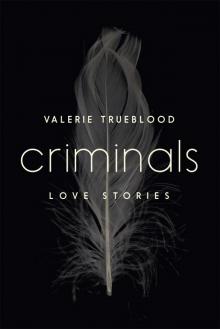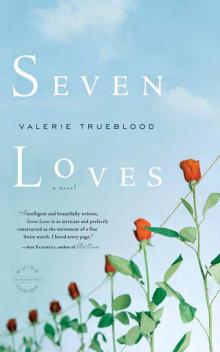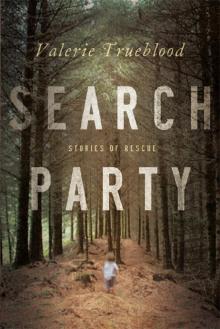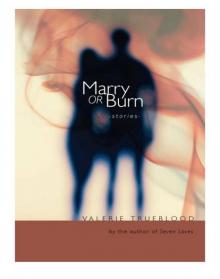- Home
- Valerie Trueblood
Criminals Page 2
Criminals Read online
Page 2
After Nathan left Raya and went to live with his girlfriend, Randy would sometimes spend the weekend with his mother, and when he did that he would meet me at the park bench to watch the ducks. Sometimes he would have a friend with him.
The black duck would not come to our bench with the others. He didn’t have a look to spare for our kind, so occupied was he with tearing at his body in a ritual to which the others paid no heed. He drove his beak into his breastbone or rooted in his wings, or spread his flat tail and worked it up and down in spasms as if to rid his body of it.
“Poor baby, he needs a new wife.” This was one of the boys Randy brought with him. He and Randy were in a poetry class together. It was the second time I had met this particular one, Reed, who wanted to be a poet. He was the only one who accompanied Randy more than once on these weekends. Randy had given him my book about Whitman and he was halfway through.
“I don’t think they can have more than one wife,” Randy said. “I think it’s all over for them after one.”
“Can’t we find him a bride?” Reed persisted.
That’s when I said, “‘Out of the Cradle Endlessly Rocking.’ Do you know that poem? Stay here. I’ll get it.”
“Oh, you don’t need to go all the way home,” Randy said.
“I want to see it,” Reed said.
“Her house is blocks away.”
“Please,” Reed said, turning to him.
When I got back with the book, they took turns reading to themselves. The off-key bells started in and Reed looked up and laughed, but when he got to the end of the poem he sat in silence. He asked if he could read it aloud. I wasn’t sure about that, because he had laughed, and there we were at the duck pond, after all, with the toddlers. But he read gravely. He was studying acting as well as poetry. Randy said so before he started. Not everyone can read this poem, with its terrible sincerity, the extremes of its romantic lament and final ecstasy. All these things amuse some readers, some students in particular, as I remember. From a bird in a nest the poem moves skyward and seaward to the immeasurable—and to Whitman, relieving—subject of death.
“Loved! Loved! Loved! Loved! Loved!” That’s the chant of the remembering bird in his nest close to the ocean. There the narrator listens to him and to the sound of the waves, which at first, before the sea makes clear its true word, comes to his ears as “soothe, soothe.”
The mate called to, coaxed, beseeched, never comes. The true mate is death, and that is the word from the sea. “Death, death, death, death, death,” the boy read. When he had finished, even the toddlers were watching him, dribbling crumbs from their bags. Finally he turned and he and Randy looked into each other’s eyes.
By Sunday evening of these weekends, whatever boy Randy had brought with him would be gone and Hans would come to dinner at Raya’s and he and Randy would go back home together.
A few weeks after Nathan left to be with his girlfriend, he came to get his daughter and the dog. All that time Caitlin had been living in a new peace with Raya. Nathan said to me, “I know how it looks, I know what Raya’s told you, but this time I’ve got it right. But Connie, I want you to watch over Raya because she’s capable of anything. Anything.”
I had been spending time with Raya as she gathered his things and Caitlin’s into boxes, saying nothing against either of them for the first time since I had known her. A trance of mildness had come over her. Caitlin too was as she had never been, free of accusation, packing up her room without stopping to pray. “Capable of anything,” I said. “Like what?”
“OK, fine,” Nathan said. “Fine. So we all are.”
It wasn’t Raya who was capable of anything, or Randy with his secrets and the strange absence, in one so amorous and kind, of what we use the words “a heart” to mean. It wasn’t Nathan, who stayed behind when his girlfriend vanished into California. It wasn’t Caitlin, who, within a week of going with her father, had taken his car and driven without a license back to Raya’s. It wasn’t the dog Morgan, who had consorted with strange dogs in obedience to a stranger, and once in her life given in to the longing to bite. It wasn’t even the black duck, who stayed behind alone when the mallards deserted the pond, lost his feathers, and did not know his bride when she came.
It was Hans. Caitlin was at my door, ringing the bell and banging. “Connie, Connie!” When I opened the door she sagged into my arms. “Can you come? Come. Hans died.”
“Died” is better than “is dead.” “Died” is a word for an act; it contains a bit of time, it contains for the briefest moment the idea that the person can somehow go back on it. When the doctor told me about my husband, I asked her, “Are you sure?” “Yes, he has died.”
Hans jumped off the balcony where we had stood when he cleared the Sound of ships to show me the great canoe.
Before he jumped, he tried to strangle Randy, but in the middle of the attempt, he let go. He gave up. He walked to the balcony doors—we do know he walked, maybe resuming his stiff manner on the way, so Randy didn’t know to hold him back—and drew them apart.
As a witness to the act, Randy got into the crowded elevator with the police and descended to the sidewalk. Desert of sidewalk. “I witness the corpse with its dabbled hair.” That’s Whitman. What Randy said, we don’t know. The police had no trouble getting him to admit to the struggle between himself and Hans, and the questioning satisfied them. They photographed the bruises on his neck, measured the distance from bedroom to balcony and the height of the rail.
Raya told me several times about a thumbprint the size of a tablespoon on Randy’s trachea, the whole neck purple where Hans’s unmatched hands had grasped and released before he jumped. She got into describing it again the day I went over to say bon voyage. “Don’t think I’m excusing my son for driving that poor man mad,” she said. I was afraid she was going to say something like, “We all loved Hans,” but she did not.
“Oh God, speaking of the mad, Nathan’s already threatening to join us in Mexico,” she said. She and Caitlin were going. Caitlin had the suitcases out on the sidewalk ready for the airport van. “Here’s where I met you,” Raya said, pointing to the spot on the pavement. “And Connie, look at this.” Around her neck she had a gold chain with a six-month AA medallion on it, from Caitlin. “Yeah, check out the ‘Recovery Gifts’ site,” Caitlin said. She was going down to join a group of Catholic students who were building an orphanage. Raya was going to visit a famous well nearby, where people came with bottles and the farmer let them pump the curative waters. “I want to be a different person. Daria says that’s possible for me.” Daria was the social worker assigned her by the court. “Oh Connie. How I long for things to just simply somehow someday be normal.”
When we say “normal” I think we must mean “good.” Is that right? How widely Whitman opened his eyes, his arms, to find death normal.
My own feeling is that we never change. Not by choice, not on purpose. I didn’t say that to Raya. For one thing I had just been noticing the new attitude in her daughter now that she was sixteen. “This will be good. She can just drink the water or pour it on herself or whatever,” Caitlin told me, getting into the front seat of the van with the driver. “Take care, Connie.”
Raya opened her window in the back. “Oh, I’m leaving you here all by yourself.”
“I’m fine,” I said. Because she wanted to be the only friend you had, you didn’t say to Raya that there were people who would look in on you, or that you didn’t care whether they did or not, because you didn’t want the helpful, oh, never, never. For yourself, you wanted the ones who would not answer, the obsessed, the ardent, the lost.
As for Randy, in the summer he was driving across the country with Reed. They were going to explore Long Island, called by the native peoples Paumanok, where Walt Whitman heard the sea speak to a bird to console it.
his rank
Knox had a favorite bar, because of the bartender, a woman he was preparing to get to know. It was on a block where the university
ran up against a changing neighborhood, close enough to the campus to bring in the grounds crew and campus security. It was small and dark, with nothing except neon beer signs in the window to set it apart from the outbuildings of the university.
The bartender had hair cut as close as Obama’s. Her eyes were so large they took time to complete a blink. When Knox first started coming in they had had a happy hour menu; now a guy in the back washing glasses would make you a plate of nachos, but that was it. The bartender was on her own, no servers.
Knox decided beautiful was a word thrown around—he had employed it a good deal himself—when it should be reserved for examples of indifferent power like that in the curve of the bartender’s eyelids as she worked the taps. When she gave you your beer she looked straight at you and that was like being wanded at the airport. Even if you were white, the eyes could say you were a man. Then something nice with the lips though not a smile. Then the luxurious blink, as if you, and the whole arrangement—time of day, frosted glass, work, play, men, women—had made her sleepy. Yes, he was going to make his move.
His feet were stiff from being hooked over a rung of the high wooden stool by the window. He had been sitting for an hour breaking up with his girlfriend, who kept saying, “It’s because I gained the weight.”
“That has nothing to do with it.”
“I weigh more than you do. You think I’ll get that big.” In a booth two hefty women in the black uniforms of campus security were sharing a plate of nachos. “Right back.” She stumbled getting down off the stool; she couldn’t hold her beer.
A man held the front door open and allowed a pit bull to precede him into the room. Big guy, already spotted by Knox in the crosswalk with his dog, with a funny look on his face that made Knox say casually to himself, Don’t come in here, dude. The man had on a green tank though it was not really warm enough for that, and he was handsome in a flaring way Knox had to admit made him uneasy even in some sports figures.
“Dog can’t come in here,” said the bartender.
“She can’t, huh?” The man advanced into the room with the dog, snubbed up tight on the leash so its front paws had to scrabble for the floor.
“You tie him up.” The bartender stretched out her whole arm and pointed her long finger.
“Bus stop. Can’t tie this kind of a dog up in a bus stop.”
“What you want to come in here for?” said the bartender, not unkindly, filling a schooner and setting it on the empty bar. “This that new dog? He nice?”
“She.” The dog sat, facing the table of the two guards eating nachos. “You did it,” the man said to the bartender. The way he said it made the dog look up and emit a growl. “You goddamn married him.”
“I did. Last Friday. I said I was.”
“You did it. OK. All right. Where is he?”
“He can’t sit around in here. He’s at work.”
“He knew you were with me.”
“I wasn’t with you, baby.”
The man reached in his pants and pulled out a gun, small as a phone. People set down their drinks in the quiet. He scanned the room with the gun, like a flashlight. The bathroom door opened and Knox’s girlfriend came out. Knox held perfectly still, praying the man’s attention onto her. But one of those girl guards was sure to pull a weapon. Everybody in the place was going to get shot. He, Knox, was going to die.
Somehow, his girlfriend took in the situation. Moving slowly, she sank into the booth with the two women. One of them put a fat arm around her. The other one had a walkie-talkie.
“Don’t nobody go on your cell or nothing,” said the bartender. “This is Jerome. I know Jerome.”
“You think you know me.” He pointed the gun at her.
“Come on, Jerome. Don’t do that. You don’t want to do that.” And she came out from behind the bar and put her hand up in front of the little stump of gun. She took hold of the barrel with two long fingers and thumb as if it were a straw she was going to drop into a drink. “Come on, now.” She raised the flap and went behind the bar. Jerome got up on a stool, and instead of putting the gun out of sight the bartender laid it down on the bar. Jesus God, are you kidding me? Knox screamed in his head.
“Sit,” Jerome said to the dog. Then he put his forehead down on the bar and his shoulders began to shake. “Baby boy,” the bartender said, spreading her fingers, with the gold ring on one, around his head and holding it while he shook.
At one table a man got to his feet. “Hey, don’t you forget the check,” the bartender called. Then Knox’s girlfriend stood up, hugged the big security guard, and started across the room to Knox. Her face shone with tears. He stared at her outstretched arms. So people loved, even many of them, and his rank among them was not high.
skylab
There it was: the blue bee. Off the clothesline and down into the flowerpots, weighing down orchids with its thumb-size abdomen. It made Amy think of fat women she had washed in nursing school. A panniculus might hang to the thighs; you lifted it on the back of your hand and wrist, swabbed carefully because of yeasts. In this country the patient’s family gave the baths, women carrying basin and washcloth from home. And here you wouldn’t see a swag of fat on a patient. As if it were new itself, this was a country of young, slim people.
Amy sat on the amah’s terrace at the back of the house, letting her hair dry in the sun. Skylab. It was on every page of the newspaper. Skylab was going to fall on Asia.
Next door the shirts on the line began to jig as the amah snatched them, with an unsmiling glance at Amy. She was a Malay girl, not an Indian like most of the amahs in this circle of houses built for foreigners, and wore the snowy headscarf. She was known to have gone down on her knees, after the Australian couple stir-fried pork on her day off, to wash everything with red mud as the Koran decreed—cupboards, drawers, refrigerator, the blackened little gas stove these houses all had.
“Wholesome dust,” the Koran said. “Pure earth.” When there was no water, pure earth could be used for bathing, for purification.
Amy and John had no amah. Eleanor, the Englishwoman who ran the Koran study group, said why not hire one simply to avoid flouting custom, but Amy knew they would not, even if her own work permit finally came through and she went to work in the hospital, they would not have somebody in the house with them, in on their life, which was too frail and groggy after the labor and shame of all that had tumbled them down here, and at the same time too full of a hot, irresistible pride in their being here alone, their having left everything behind.
The blue bee challenged her whenever she hung something on the clothesline. She could see where it had been chewing the clothespins. A bee that ate wood? It was solitary, territorial, more like a shrunken comical dog than an insect.
She was starting to miss dogs, the easygoing, confident dogs of home. In contrast to the thin and craven animals here, they seemed, those golden retrievers with waving tails, to have been the kindly guards of everything untroubled and ordinary.
The bee had a routine: it would zigzag in front of her face like a bulldog on a chain, flexing its iridescent hind parts in midair. Did it have a sting? But it was cowardly, it dodged out of sight.
“You are eating those clothespins,” she said aloud. It ate everything. She had seen it squeeze out from under the lid of the garbage can, going at a drunken sideways crawl. Now, just like a dog giving up on barking, it had blundered downward and zeroed in on something at her feet.
An eviscerated bird. That was the smell. A bird with empty eye sockets. Yes, the beak pointed at their door. She thought without surprise, They left it. For us, for the infidel.
Here you saw the word in the paper every day, ever since the Shah had fallen in Iran. Infidel. The Shah had been spat out, he could find no harbor, now he was in Mexico trying to get to the US. In the shade of every building young men stood talking, striking their palms. US. You heard it, a hiss among the soft syllables. Amy wore skirts and long sleeves but eyes followed her. It didn’t m
atter that she freely borrowed the code for virtue, keeping her eyes down and her step narrow.
Among the white scarves on the campus a black fin, too, rose now and then, the chador. The chador had to do with men as well as God. Inside it moved women like the nuns of her childhood, but more complex in their loyalties and more secret. The eyes, though, were just embarrassed young eyes, the eyes of girls, students, sending skittish glances.
Inside, blinking from the sun, she saw a cellophane wrapper on the floor of the amah’s little pantry, where she never went except to trip the hot water heater after a thunderstorm. She reached for it and stood up fast. The pale crinkled thing was the skin of a snake. Along the wall lay eight or ten inches of it, silver and empty, and somewhere behind the water heater the rest of it. However long it was. Its head.
John would know what to do. He had lived here before. He remembered many things: he knew the plague of frogs in the drain would end, he could predict the first yap of the hungry house lizards, the cicaks, coming out from behind calendars and picture frames at the cocktail hour, when the air would fill with mosquitoes for them to catch. He would tell her what to do about the snake. He would say a cat had left the bird. “If it were for us”—she could hear him—“they would have put it at the front door.”
Despite the white hair John didn’t look his age, but bit by bit she recognized the time hidden on him, brought in with them like contraband. It was the old-fashioned obviousness of his teasing, his careful fingers bringing up the knot of his tie. His way of waving, his saying “Drink up” and “Right-o.” She had seen it in movies. His flick to alertness if she casually said “fuck,” his inability to hear it as anything but sexual. While she, whose lust for him had been legendary among the nurses, had entered a state of quietness and caution, and become watchful, as a bird might watch its nest from another tree.

 Criminals
Criminals Seven Loves
Seven Loves Search Party
Search Party Marry or Burn
Marry or Burn